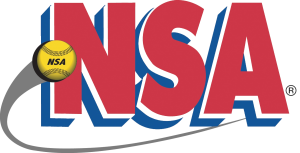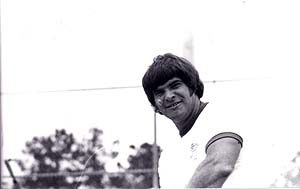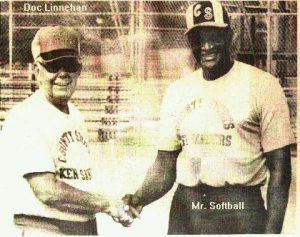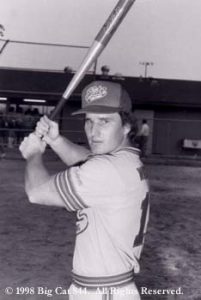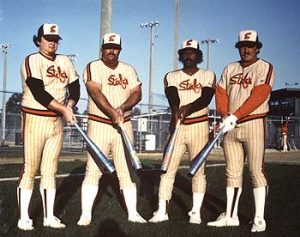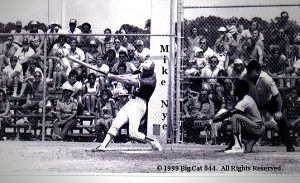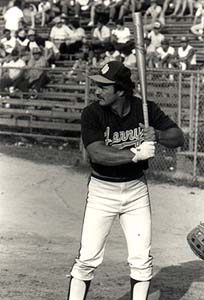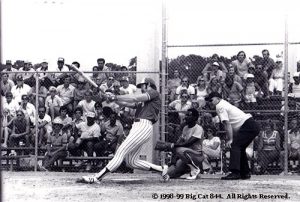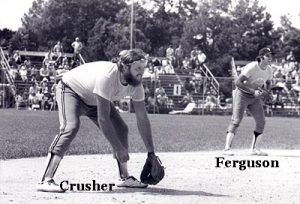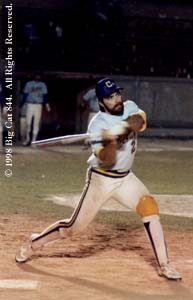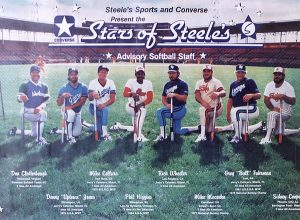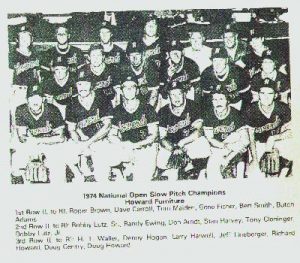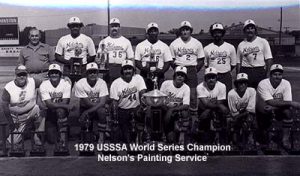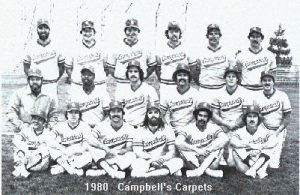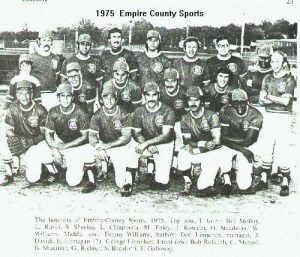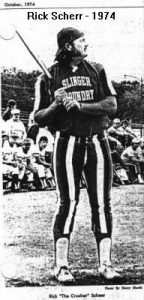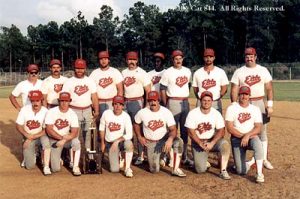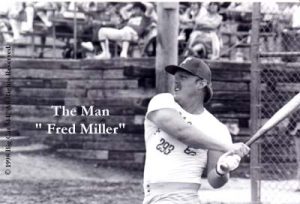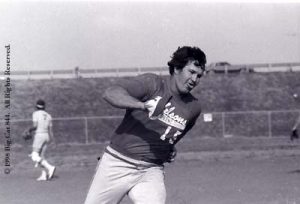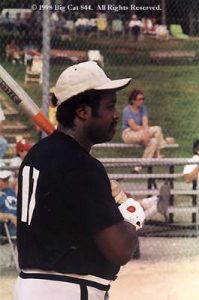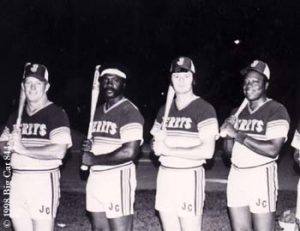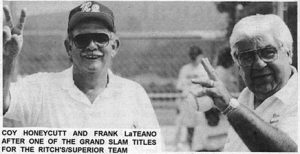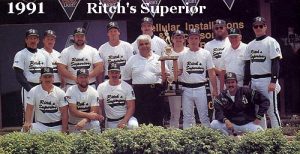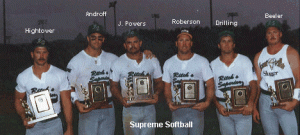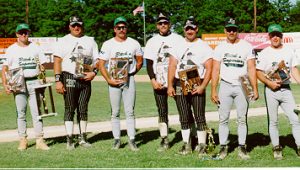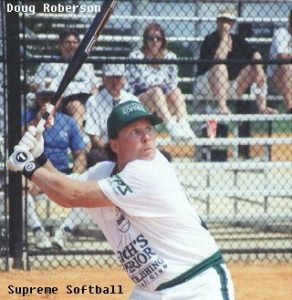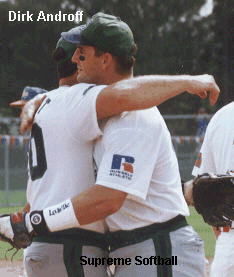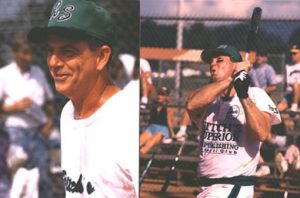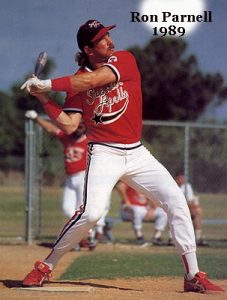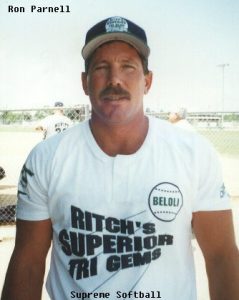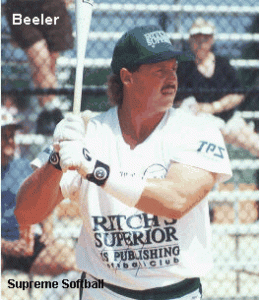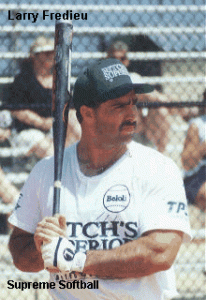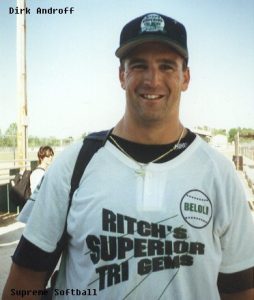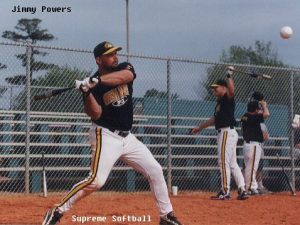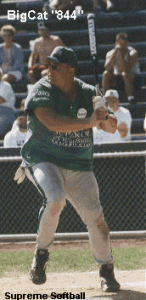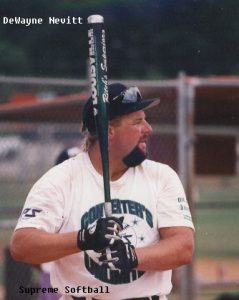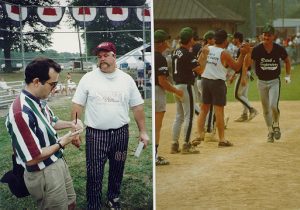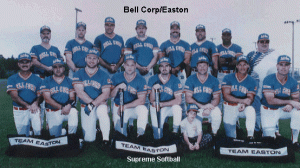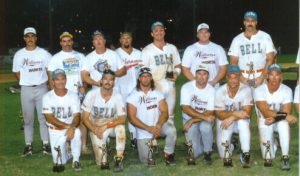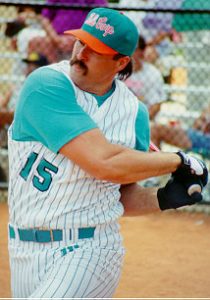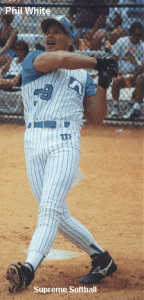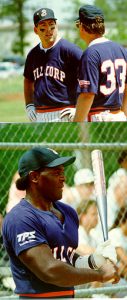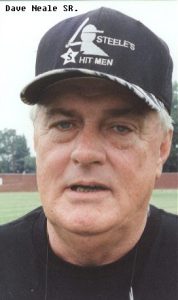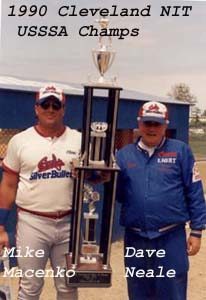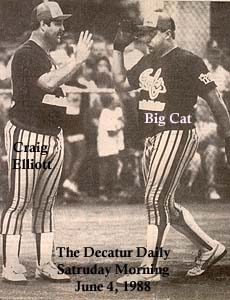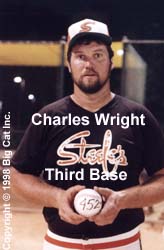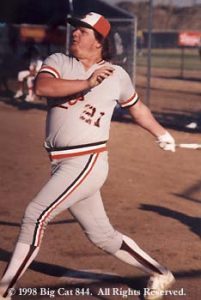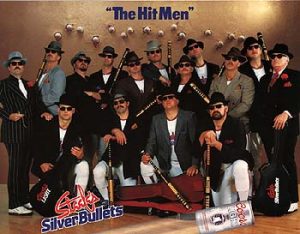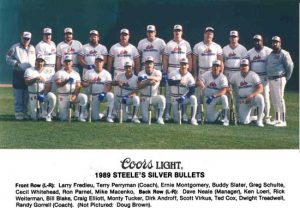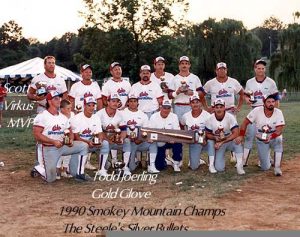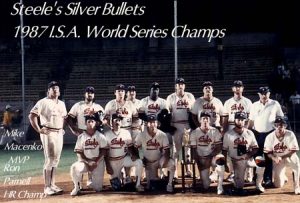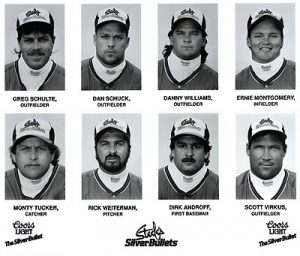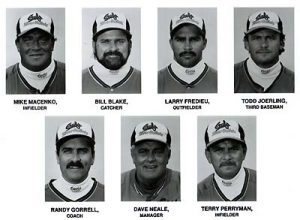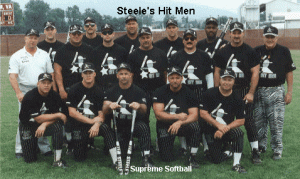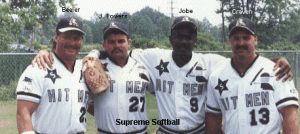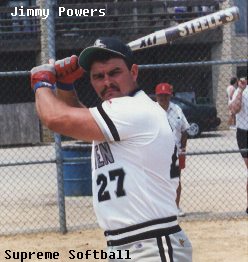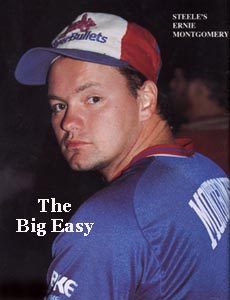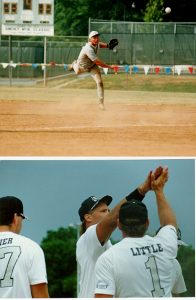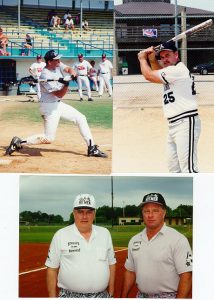Southeastern Invitational held at Oakland Terrace Park in Panama City, Florida.
1964 — Buddy’s Sporting Goods, Tallahassee, Fla., def. Independents, Panama City, Fla. (The Independents won one game by 1-0 over Pure Oil of Tallahassee; the game lasted 37 minutes)
1965 — Commander’s Firebirds, Panama City, Fla., def. Buddy’s (Note: Firebirds same team as Independents; Buddy Alley, Buddy’s big home run hitter, was intentionally walked by Commander’s pitcher Gary Walsingham every time in the two-game finals, except the last time when he hit a grand slam; Commander’s had an 18-run lead at the time; Alley’s son, Scott, became a strong hitter — for such teams as Newman’s, Back Porch, DJ’s, Herrin and Resmondo)
1966 — Buddy’s def. Jo’s Pizza, Milton, Fla. (Note: The Bi-City Merchants out of the Columbus-Phenix City area scored 53 runs in one game, hitting 21 home runs)
1967 — Jo’s def. Kobax, Chattanooga, Tenn.
1968 — Jo’s def. Emory’s, Knoxville, Tenn.
1969 — Jo’s def. Barwick’s, Panecea, Fla. (Note: No team from outside northwest Florida has yet to win this tournament; H.T. Waller, who helped spark Jo’s to a runner-up finish in the ASA nationals in 1968 and 1969, had 12 home runs; he was walked 12 times, 10 times intentionally)
1970 — Valley Merchants, Lanett, Ala., def. Jo’s (Note: Chester Dungan hit 7 home runs in one game for Jo’s; Dungan and teammate H.T. Waller each had 16 home runs for the tournament; Dungan also had a single for an 8-for-8 performance in his 7-HR game as Jo’s beat Golden Gallon of Chattanooga, one of the co-favorites, by 40-30; Jo’s had 28 homers, Golden Gallon 16; A member of the Golden Gallon team was Stan Harvey, who went on to play for Howard’s 3-time ASA and 2-time USSSA champions)
1971 — Jo’s def. Valley Merchants (Note: There was a 16-inning game, with Southern Wholesalers of Rossville, Ga., outlasting the Atlanta Merchants 3-2; there was a string of zeroes for 8 innings before the game was finally decided in the 16th inning)
1972 — Warren Motors, Jacksonville, Fla., def. Jo’s
1973 — Southern Fastener, Mobile, Ala., def. Buddy’s (Note: The local Commander team had a 24-run inning, including 3 grand slams, 2 by Charles Commander; the team came in with a 63-8 record and had won five of seven tournaments, but finished a disappointing tie for 7th place)
1974 — Howard’s Furniture, Denver, N.C., def. Southern Fastener (Note: First time that no northwest Florida team was in the finals)
1975 — Jo’s def. Hammon’s, Tallahassee, Fla. (Jo’s won five times and was runner-up another three times between 1966 and 1975)
1976 — Tom’s Peanuts, Columbus, Ga., def. Reed’s Nuts, Macon, Ga. (Note: Tom Beall, who later earned ASA Hall of Fame recoginition as a member of Howard’s, had a tournament record 18 home runs for Reed’s, which went on to win the ASA Class A title that year)
1977 — Ken Sanders, Phenix City, Ala., def. Buddy’s (Note: James Abercrombie was the MVP, going 10-for-10 with 5 home runs in two wins over Buddy’s; Ken Sanders was runner-up in the ASA nationals that year)
1978 — Ken Sanders def. Alco Roofing
1979 — Barbeque Kitchen, Atlanta, Ga., def. St. Andrew Baptist, Panama City, Fla. (Note: Warren Scarborough set tournament record with 30 home runs as his team lost its first game, then won 10 games in a row)
1980 — Action South, Nashville, Tenn., def. Dubose Insurance, Pensacola, Fla.
1981 — Ken Sanders, Augusta, Ga., def. Elite Coatings, Gordon, Ga. (Note: It was the third Southeastern championship in five years for the Ken Sanders team. Craig Elliott batted .818 with 18 home runs, his younger brother Scott .806 with 12 HRs; Elite’s Graig Merritt, not a big guy and batting in the #10 slot, hit a tournament record 8 home runs in one game — a 69-42 win over defending champion Action South; There were 73 home runs in the game, 50 of them by Elite, including 27 in a 36-run second inning. Elite, with such players as Cecil Whitehead and Ricky Huggins, went on to win the ASA Major Nationals in the first year that the Major and Super were divided up; Ken Sanders, which won the final game by a stunning 31-7 score, played in the ASA Super Nationals that year. Whitehead had 7 homers and Huggins 5 in the big home run game; Two Elite players had 6 HRs — Ed Jones and Don Knight; Two more had five; Merritt made an out in the first at-bat, then had 8 HRs in a row.)
1982 — American Amicable, Crestview, Fla., def. Bobby’s, Chester, Ga. (Note: Led by co-MVPs Mike Cobb and Mike Amerson and big Frank Sorrells, American Amicable went 6-0 and hit 33 home runs in one game.
1983 — Elite def. Miller Lite, Chattanooga, Tenn. (Note: MVP Craig Elliott went 30-for-33 with 23 home runs; Elite, which came into the Southeastern owner of a 75-4 record and ranked No. 1 in the country, went on to win the National Slo-Pitch Conference crown, but was upset in the ASA Super and the USSSA World Series; Sollie’s won one game by 3-2 over Budmen of Tallahassee)
1984 — Sollie’s, Panama City, Fla., def. Barrington Ford, Columbus, Ga. (Note: Sollie’s only the second Panama City team to win this tournament in 20 years; no other Panama City team has won since; Frank Sorrells, John Hicks and MVP shortstop Kevin Balcerak from nearby Niceville, Fla., helped spark Steve Culverhouse’s Panama City team; Barrington won one game by 3-2 over the Budmen of Tallahassee)
1985 — Newman’s 76ers, Tallahassee, Fla., def. Jim McGill Chevrolet, Birmingham, Ala.
1986 — Newman’s def. Jim McGill
1987 — C&M Sports, Dothan, Ala., def. Columbus (Ga.) Fire & Safety
1988 — Don’s, Birmingham, Ala., def. Back Porch, Destin, Fla.
1989 — Back Porch def. C&M
1990 — Cannon Roofing, Savannah, Ga., def. Rick Downs, Pensacola, Fla.
1991 — C&M def. H&H, Panama City, Fla.
1992 — Back Porch def. Gentry’s, Columbus, Ga.
1993 — Rusty Faulk, Luverne, Ala., def. Southland, Gainesville, Ga.
1994 — Back Porch def. Deep South, Jackson, Miss. (Back Porch won the ASA Major title in 1993, and was runner-up in 1994; It was the third Southeastern championship for Back Porch)
1995 — JB’s, Gainesville, Ga., def. Abbott’s, Crawfordville, Fla. (Note: JB’s was a “pick-up” team, with several players from the powerhouse Superior/Southland team, including Rob Darhower (the MVP who went 25-for-28), Sylvin Little (who had 18 homers), Tim Williamson and Joey O’Dell (who each had 17 homers) and Dewayne Frizzell and Mike Stanley (who each had 15 homers); JB’s won one game 67-65 over Back Porch/Moulton; Darhower and Stanley were former Back Porch players; Back Porch/Moulton finished third, losing a 70-69 shootout with JB’s)
1996 — Memory Lane, Columbus, Ga., def. TNT, Pensacola, Fla. (Note: Phil White went 51-for-56 with 20 home runs as Memory Lane, a “pick-up” team, lost its first game, then won eight in a row; Kenny Carver had 28 home runs, Charles Wright 27)
1997 — Metro Merchants, Atlanta, Ga., def. Hudson’s, Samson, Ala. (Note: Russ Earnest hit 21 home runs for the runner-up team; the third-place finisher, Moulder & Sons of Panama City, had 84 runs and 40 home runs in one game; Barry Reynolds and Andy Cobb each went 9-for-9 with 6 home runs and Tony Dixon also had 6 homers)
1998 — Knoxville Billiard, Knoxville, Tenn., def. Horsemen, Panama City, Fla. (Note: Russ Earnest hit 21 home runs for the runner-up team)
Note: The Southeastern was the first invitational tournament in the South that matched teams from different states, except for the ASA regionals. The tournament always had a “waiting list” in the late 1960s, the 1970s and the early 1980s; It started as a 16-team tournament, grew to 36. Like the Smoky Mountain Classic now, every team had to play on Friday night. Saturday night’s play ran late, late, late. The Stroh’s Invitational in Springfield, Ohio, was started in 1960; Oakland Terrace Park was the third four-field “wheel” complex in the country, behind Salt Lake City and Toledo, Ohio; Oakland Terrace Park itself celebrated its 50th anniversary in 1998. Some facts and figures: Of the 34 Southeasterns, teams from north Florida, Alabama or Georgia have won 31 times and finished runner-up 31 times; Teams from north Florida have won 15 times and were second 16 times, and teams from nearby south Alabama have won 4 and finished runner-up 3 times; Teams from Georgia have won 10 times and have been second 13 times; Teams from Alabama have won 5 times and been second 5 times; Teams from Tennessee have won twice and been second 3 times; The only other championship was by Howard’s out of North Carolina (1974); Jo’s Pizza won 5 times, was runner-up 3 times between 1966 and 1975; Buddy’s won 2 and was runner-up 3 times between 1964 and 1977; Ken Sanders won 3 times between 1977 and 1981; Back Porch 3 times between 1989 and 1994; Newman’s and C&M each won twice.
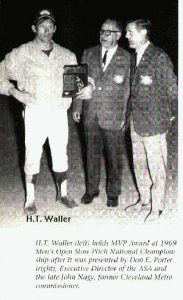
H.T. Waller, from little Vernon, Fla., set the ASA national tournament home run record with 16 and was voted the MVP for runner-up Jo’s Pizza of Milton, Fla., in 1969 at Parma, Ohio; It was the second year in a row that Jo’s was the runner-up team; Also pictured are John Nagy, Cleveland Metro commissioner, and Don Porter, ASA executive director. After playing quarterback and linebacker in high school, Waller was defensive end for the FSU Seminoles. He was a big league pitching prospect before an elbow injury in football ended his pitching hopes.

